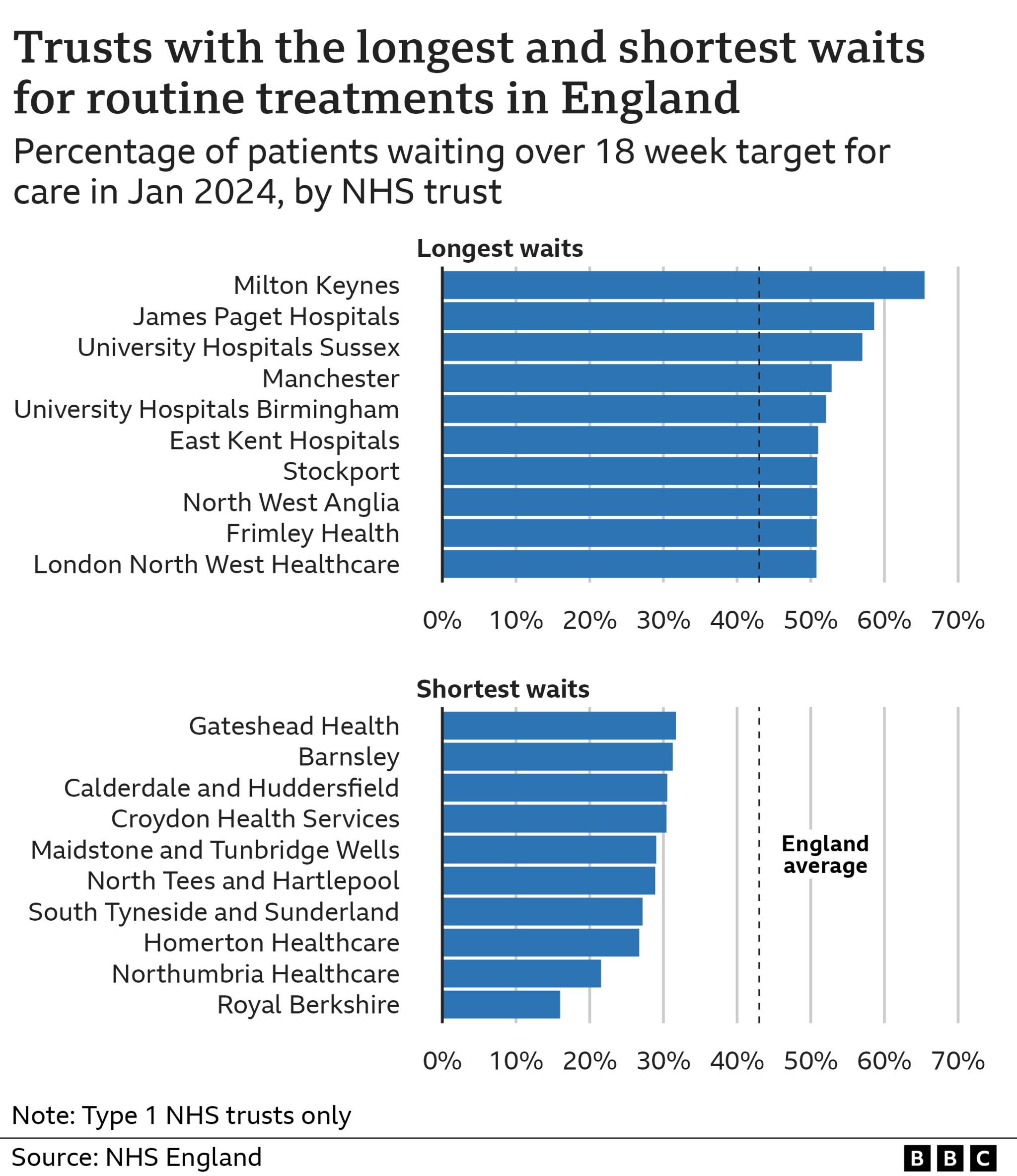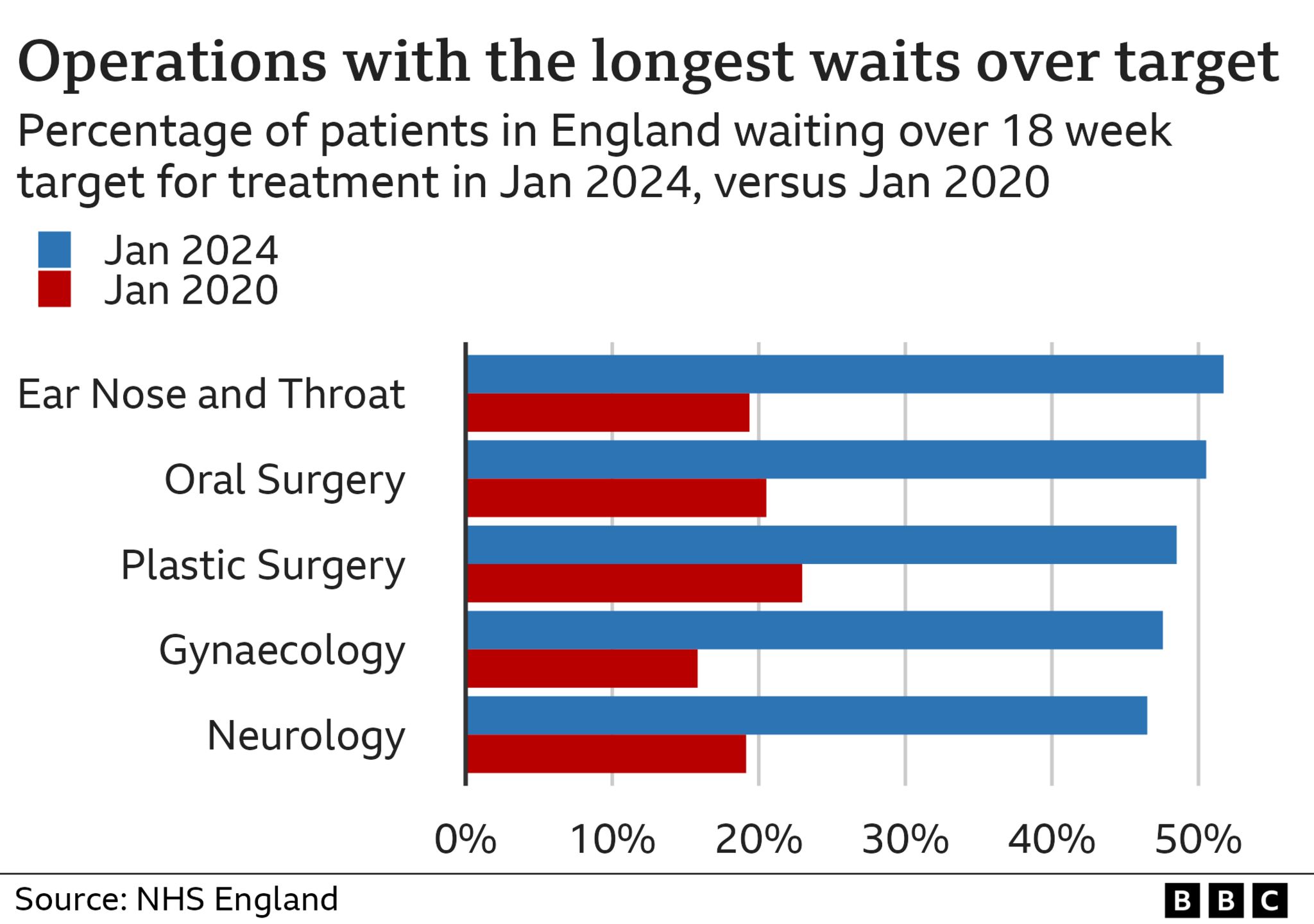-
Published51 minutes ago
There is wide variation across England in how long patients wait for hospital treatment, BBC News analysis reveals.
Patients should start treatment within 18 weeks but at the worst-performing hospital trust, Milton Keynes, nearly two-thirds are waiting longer.
And that is four times as many as are waiting over 18 weeks at the best-performing trust in the country.
It comes as figures for the end of January show the overall waiting list had fallen slightly to 7.58 million.
Experts said while there were some valid reasons for the variation identified by BBC News, the scale of the differences was also down to some hospitals’ poor performance.

King’s Fund think tank chief analyst Siva Anandaciva said factors such as the underlying health of the local population, for example, could only partly explain the findings.
Some of the differences were clearly “unwarranted”, he said, and due to how well individual hospital trusts were performing and managing their waiting lists, including maximising use of operating theatres.
“The focus on the national picture masks that you can have a significantly different experience of care if you live in Camden or Cumbria,” Mr Anandaciva said.
“Ultimately, it does really test the ‘N’ in ‘NHS’.”
But Mr Anandaciva also pointed out no trust’s performance was great – with every one missing the target to see 92% patients within 18 weeks.
‘We can’t rely on NHS’

Liz Magnall, 58, from Bury, is one of those who found herself facing a long wait at one of the worst-performing trusts.
She was on a Manchester University NHS Trust waiting list for a gynaecological procedure, until, with worsening symptoms, opting to borrow money to pay to have the treatment privately.
The doctors treating Ms Magnall also spotted early signs of cancer, so she ended up having a hysterectomy to stop the disease developing.
She feels relieved she went private. “I literally don’t know how long I would have waited on the NHS,” Ms Magnall said. “I feel great now.
“My advice? Go private. We can’t rely on the NHS.”
Manchester University NHS Trust said waits had now improved for the sort of treatment for which Ms Magnall had been waiting.
And a spokesman said the trust was happy to meet her to discuss her case.
The trust had some unique pressures, he said, pointing out it was the largest in the country, running 10 hospitals, and took on many of the most complex cases from other hospitals across the region.
Productivity ‘varies’
Other struggling trusts also said progress was being made on backlogs.
In March last year, Milton Keynes University Hospital predicted it would return to “sensible waiting times” within two years.
Since then, it has tried a variety of initiatives, including doing more robotic surgery and asking staff to work overtime to run extra clinics.
It has also recently launched a new mobile operating theatre.
A spokesman for the hospital said waiting times were improving, adding: “Teams across the hospital continually review waiting lists and are working tirelessly to bring appointments forward where possible.”
Tackling the hospital backlog, which covers planned treatments such as knee and hip operations, is one of the government’s key priorities.
But it has failed to make significant inroads into reducing the total number waiting for treatment, which is now more than three million higher than before the Covid-19 pandemic.
Rory Deighton, of the NHS Confederation, which represents hospitals, said much of it was out of the control of individual hospitals and due to the “cards many have been dealt”.
Money to invest in new buildings and equipment varied, while staffing shortages and access to social care to help patients out of hospital could “vary considerably”.
“This impacts how productive each trust can be,” Mr Deighton said.
‘Deliver improvements’
NHS England said since the pandemic it had had to focus on tackling the very longest waits, of over 18 months.
Significant progress was being made with that and steps were being taken to reduce variation, including writing to those patients who had waited over 40 weeks to offer them treatment at other hospitals.
The worst-performing trusts were receiving extra support, which should “deliver improvements”, a spokeswoman added.
The other UK nations are also missing their targets to see patients needing planned care.
The BBC News analysis also reveals ear, nose and throat (ENT) services are the specialism with the longest waits.

ENT has long argued more needs to be done in the community to stop so many patients being referred to hospital with uncomplicated problems such as rhinitis and tinnitus, which commonly causes ringing in the ear.
Royal College of Surgeons of England president Tim Mitchell, himself an ENT surgeon, said too many ENT patients were being “left in limbo” and struggling in pain, with reduced quality of life..
But he added: “No area of healthcare is immune to the immense challenges facing the NHS.
“It is imperative that in the upcoming general election, political parties set out detailed plans for how they will properly fund and support ongoing reform of the NHS.”
-
-
Published25 May 2023

-